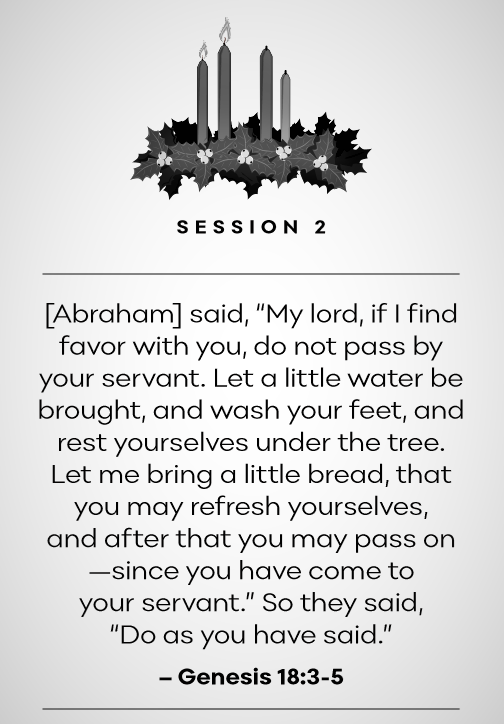Advent is a season of anticipation, of waiting and of preparation. In faith, we prepare our hearts and minds for the coming of the Christ, joining the sacred journey of the holy family to the manger where the Savior will be born. Unlike the innkeeper in the Gospel of Luke, we know the guest who is coming, and prayerfully, we prepare for the Christmas morning arrival.
In the midst of this spiritual preparation, many families will be making the practical preparations for the arrival of kith and kin in their homes for the holiday festivities. The season is marked by careful planning — and lots of work! — to ready our homes for guests from near and far.
The hosting of guests in the home and at the table is a recurring event in the Bible. In one of the earliest stories, Abraham is cooling himself in the shade of the oak trees in Mamre when three strangers approach. Abraham immediately goes to meet them and invites them to stay and dine with him and Sarah. The three strangers — messengers of God on their way to Sodom — accept the invitation with a promise: Sarah, despite her advanced age, will bear a son.
It isn’t clear from the story in Genesis 18 whether Abraham knew from the start the identity of the guests he invited to his tent. For Martin Luther, the question isn’t significant. What is significant for Luther is that Abraham’s invitation is a central example of the distinctive hospitality of the people of God. Abraham’s ancestors, wanderers themselves as God brought them to the promised land, “treated all guests rather respectfully and hoped for occasions on which they themselves would associate with angels.” Luther saw in Abraham’s example a lesson for the church in all ages: In love, we are called to attend to the needs of strangers with “generous and bounteous” hospitality. To be church, for Luther, is to be “like some refuge of the exiles and the poor,” those whose well-being depends on the hospitality of others.
The uninvited guest at holiday celebrations can throw a wrench in the best-laid plans. Another place at the table must be set, another plate must be prepared. Sometimes their presence is a welcome surprise. Often, their presence is a problem that must be addressed.
How often do we treat the unexpected stranger as a problem to address rather than as a welcome surprise? Much of the rhetoric about neighbors in need makes it easy to miss the humanity of the stranger in our midst. A neighbor living in poverty becomes a statistic, a member of “the poor” whose poverty must be managed. A family seeking refuge in a new country becomes yet one more set of “migrants,” the growing numbers of which must be “dealt with.”
Around some tables this holiday season, guests will find their names written on handcrafted cards indicating their place at the table. This seemingly simple act is a powerful symbol of welcome. Here, at this table, you have an identity. You have a place. Crafting and displaying nametags is a simple yet profound act of hospitality. Hospitality, at its root, is a witness to the identity and inclusion of each person at the table. Wanderers at Mamre become “lords” at Abraham’s table. “Exiles” in Luther’s Germany become guests worth serving and protecting in the refuge of the church.
Luther links Abraham’s hospitality with the well-known line from Hebrews: “Do not neglect to show hospitality to strangers, for by doing that some have entertained angels without knowing it” (Hebrews 13:2). By showing radical, abundant hospitality to the three strangers, Abraham and Sarah opened themselves up to the strangers’ revelation of their full identity as messengers of God — and to the promise of God they bring. We may not encounter angels in our community this season, but by remaining open to the strangers God sends into our midst, by keeping our spiritual “inns” open to the guests who come to our door, we can prepare for God to be revealed in the unexpected neighbors we encounter.
Hospitality means more than being polite. It means remaining open to what God is revealing to us through our neighbors — and it is a witness to the world that every neighbor is welcome at our table.
Questions for reflection
- How does Abraham’s story shape our understanding of hospitality?
- In what ways do our church and our larger community show hospitality toward strangers? do our neighbors experience our church as a refuge welcoming them in or as a fortress keeping them out?
- How can the practice of hospitality be a witness to the value and dignity of all our neighbors?
Prayer
Loving God,
you welcomed people into relationship with you while we were still sinners, stranger to your promise. Guide us to show hospitality to the neighbors in our midst, that our church may reflect the grace and love you first showed us. Let out open table give rise to open hearts that witness to the dignity and worth of all of your creation. In your gracious name, we pray.
Amen.
Learn
To download this entire study, or to see some of our other congregational resources, please visit www.elca.org/Resources/ELCA-World-Hunger.
Give
Gifts to ELCA World Hunger are acts of love towards our neighbors living with hunger and poverty both here and around the world. Together, we are creatively and courageously working toward a just world where all are fed.
Connect
Sign up here and receive news, information and the latest resources from ELCA World Hunger.


